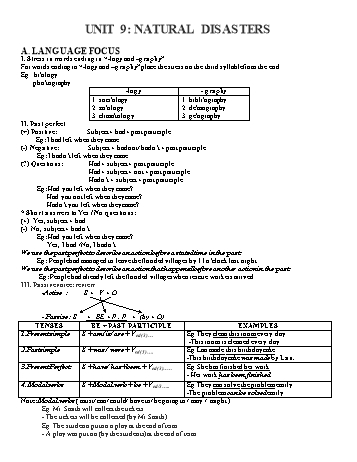Đề cương ôn tập môn Tiếng Anh Lớp 8 (Chương trình thí điểm)
IV. Choose the best answer A, B, C or D to complete each of the following sentences.
1. An example of a natural disaster is a _______ .
A. snowfall B. tornado C. thunder D. rainbow
2. A severe topical is _______ called a typhoon.
A. drought B. rain C. flood D. storm
3. Dozens of buildings_______ when an earthquake measuring 7.2 on the Richter scale hit the City.
A. destroyed B. collapsed C. buried D. damaged
4. Hundreds of people were made _______ after the flood.
A. homeless B. helpless C. careless D. endless
5. We cannot prevent natural disasters, but we can for_______ them.
A. defeat B. invent C. struggle D. prepare
6. – “No one was killed in the forest fire two days ago”. “_______!”
A. Oh dear B. That’s shocking C. That’s a relief D. How terrible
7. Thousands of people _______by natural disasters every year.
A. are affected B. are affecting C. have affected D. were affected
8. The roof of the building _______ in a storm a few days ago.
A. damaged B. was damaged C. has damaged D. has been damaged
9. All the villages_______ to safe areas before midnight last night.
A. evacuated B. were evacuated C. had evacuated D. had been evacuated
10. As soon as the floodwaters________ down, people their houses.
A. went – cleaned B. had gone – cleaned
C. went – had cleaned D. had gone – had cleaned
V. Read the passage. Answer the questions below.
Hurricanes, cyclones, and typhoons are all the same weather phenomenon; we just use different names for these storms in different places. In the Atlantic and Northeast Pacific, the term “hurricane” is used. The same type of disturbance in the Northwest Pacific is called a “typhoon” and “cyclones” occur in the South Pacific and Indian Ocean. The ingredients for these storms include a pre-existing weather disturbance, warm tropical oceans, moisture, and relatively light winds. If the right conditions persist long enough, they can combine to produce the violent winds, incredible waves, torrential rains, and floods we associate with this phenomenon. In the Atlantic, hurricane season officially runs June 1 to November 30. However, while 97 percent of tropical activity occurs during this time period, there is nothing magical in these dates, and hurricanes have occurred outside of these six months.
1. Which name is used for very big storms in Northwest Pacific?
Tóm tắt nội dung tài liệu: Đề cương ôn tập môn Tiếng Anh Lớp 8 (Chương trình thí điểm)

ple had managed to leave the flooded villages by 11 o’clock last night. We use the past perfect to describe an action that happened before another action in the past. Eg: People had already left the flooded villages when rescue workers arrived. III. Passive voice: review -Active : S + V + O - Passive : S + BE + P . P + (by + O) TENSES BE + PAST PARTICIPLE EXAMPLES 1.Present simple S + am/ is/ are + Ved(3). Eg.They clean this room every day. -This room is cleaned every day 2.Past simple S + was / were + Ved(3).. Eg.Lan made this birthdaycake. -This birthdaycake was made by Lan. 3.Present Perfect S + have/ has +been + Ved(3) Eg.She has finished her work. - Her work has been finished. 4. Modal verbs S + Modal verb + be + Ved/3 .. Eg.They can solve the problem easily. -The problem can be solved easily. Note: Modal verbs ( must/ can/ could/ have to/ be going to / may / might ) Eg. Mr Smith will collect the tickets. - The tickets will be col... to prepare for the forthcoming storm. .................................................................................................................................................................................... 4. We should move the furniture to higher places because of the flood. .................................................................................................................................................................................... 5. They had repaired their house before the typhoon came. .................................................................................................................................................................................... 6. What kind of injuries do earthquakes cause? .................................................................................................................................................................................... 7. The government didn’t warn the people about the possibility of a tsunami. .................................................................................................................................................................................... 8. Have the workers restored the damaged bridge yet? .................................................................................................................................................................................... 9. I hadn’t put the car into the garage before the hail occurred. .................................................................................................................................................................................... 10. We will send rescue workers to the flooded villages. .................................................................................................................................................................................... IV. Choose the best answer A, B, C or D to complete each of the fol... Atlantic, hurricane season officially runs June 1 to November 30. However, while 97 percent of tropical activity occurs during this time period, there is nothing magical in these dates, and hurricanes have occurred outside of these six months. 1. Which name is used for very big storms in Northwest Pacific? .................................................................................................................................................................................... 2. Where is the name “cyclones” used? .................................................................................................................................................................................... 3. What are the features of the severe storms which occur within a long time? .................................................................................................................................................................................... 4. When do hurricanes often occur? .................................................................................................................................................................................... 5. Is it possible that hurricanes can occur even when it is not hurricane season? .................................................................................................................................................................................... VI. Read the passage. Task 1: Match the statement A-H with suitable paragraph. A - This writer didn’t experience the worst manifestation of the natural disaster. B - This writer had his movements limited. C - This writer saw earth and rocks moving. D - This writer was blinded by the natural disaster. E - This writer was helped by a stranger. F - This writer’s experience was not as serious as a violent tropical storm. 1. I was in a typhoon in Hong Kong, and I just arrived with a big heavy backpack, and I had to hide in
File đính kèm:
 de_cuong_on_tap_mon_tieng_anh_lop_8_chuong_trinh_thi_diem.docx
de_cuong_on_tap_mon_tieng_anh_lop_8_chuong_trinh_thi_diem.docx

